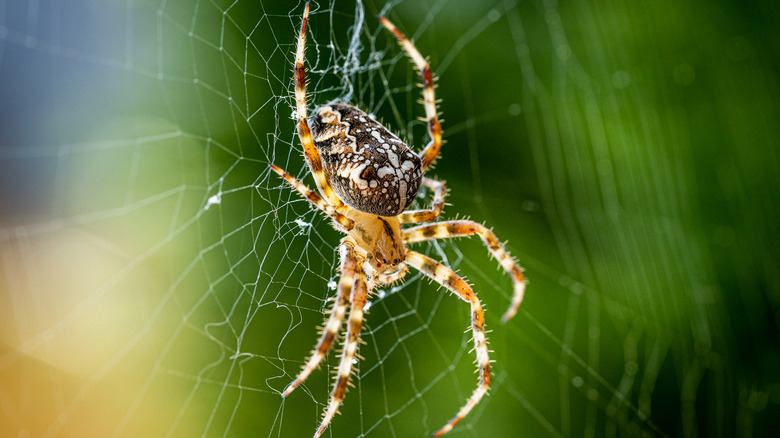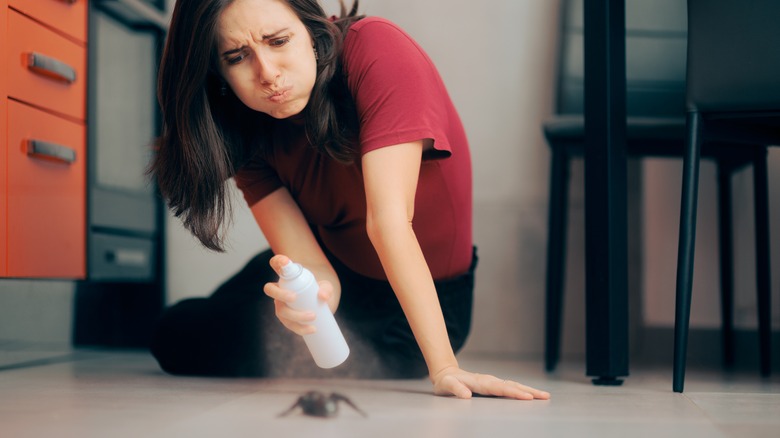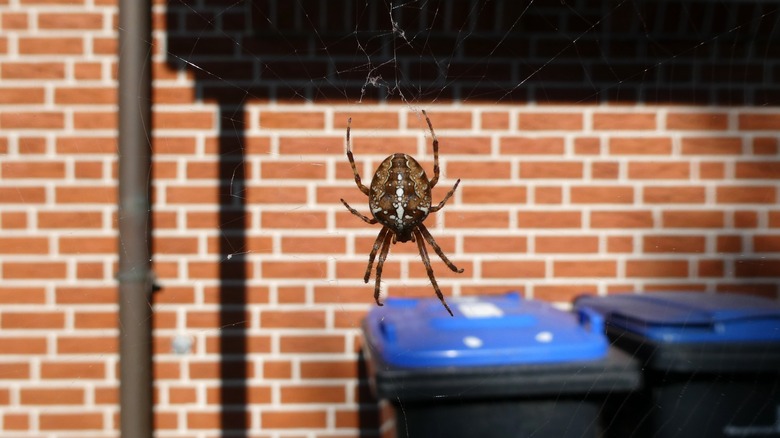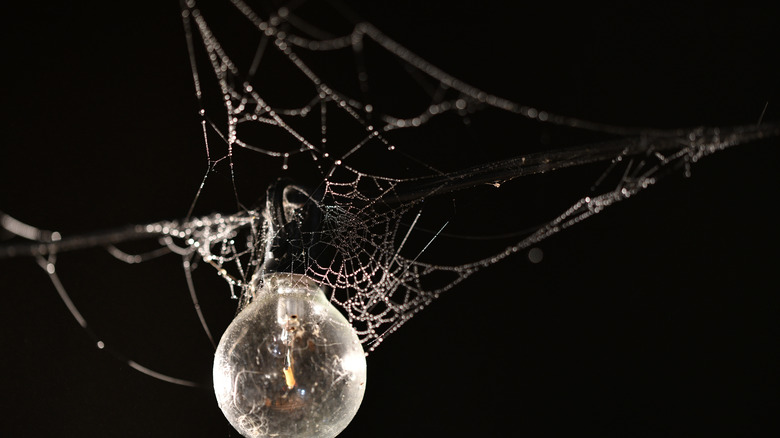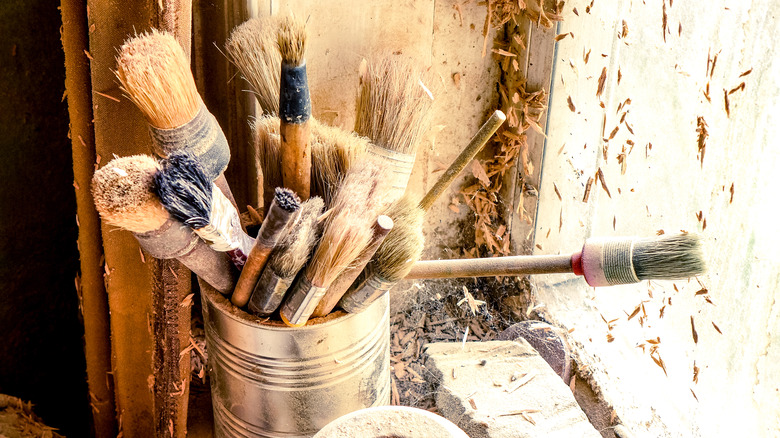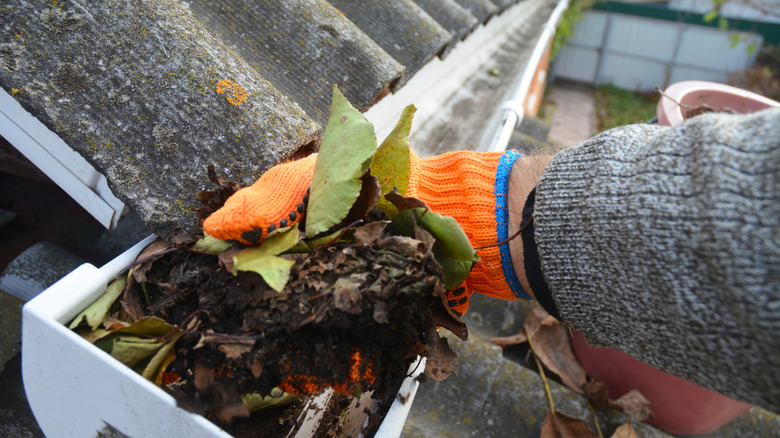How To Stop Spiders From Building Webs On Your Home's Exterior
Just when you think you've solved your interior spider problem, you spot an intricately woven web on your home's vinyl siding. Fantastic. In addition to their pesky and unsightly home bases, some creepy crawlers pack enough venom to kill a human. Admittedly, arachnologist Chris Buddle (via Live Science) states that spiders almost never attack unprovoked. However, one can be forgiven for being frightened by something so dangerous, yet so hard to spot.
Don't get us wrong; we don't have a problem with spiders. In fact, they can be incredibly useful for keeping the number of flies and other bugs around your home at bay. So it all boils down to this: Can you stop them from building webs on your home's exterior? Luckily you can, even without using any chemical bug sprays. It will take a bit of consistency, but nobody said that home ownership would be easy. Keep reading to discover some of the best ways to stop spiders from building webs on the exterior of your home.
Eliminate the current spider population
Before you can prevent new webs from appearing on your home's exterior, you need to ensure that the current spider population is dealt with. According to Panther Pest Control, the best way to do this is by searching wood piles, door frames, potted plants, and of course, sheds, barns, and garages near your home. You'll have to be thorough, however, as spiders are rather sneaky and will hide in dark corners and even cracks in the walls. If you have a large infestation in a specific area, you'll need to carefully remove everything before cleaning and sanitizing to ensure they don't come back.
When rummaging around your home looking for spiders, you may choose to wield a can of bug spray to do the dirty work for you. However, a recent study published by the Journal of Environmental Toxicology and Pharmacology has shown that bug sprays often contain chemicals that can damage your health and the environment. As such, consider repelling spiders and bugs naturally with ingredients that don't harm the environment. Some of your top options are rosemary, mint, lemongrass, and basil.
Improve garbage disposal methods
If you're attempting to permanently banish spiders from your home's exterior, you should pay more attention to how you dispose of your garbage. It's no secret that flies are attracted to garbage cans. So, if your garbage can is routinely dirty or ajar, you'll have a steady supply of flies. Apart from how unsanitary this can be, it may also attract spiders who'll weave webs to entrap those flies, per Mr. Pest Control.
So, what are your options? Well, one simple trick is to keep your garbage can closed. Cleaning the exterior of your bin also works wonders, as it removes dirt and smells that attract flies. Another way to improve your garbage disposal method is by taking a tip from the Environmental Protection Agency and practicing green waste disposal, more popularly known as composting.
The EPA suggests composting as a way to handle food scraps, which will likely help you cut back on unwanted insects around your home. You'll also be pleased to discover that making your own DIY compost is really easy. It might require extra time to separate biodegradables from non-biodegradables, but the results are totally worth it, and as a bonus, you're doing your bit to battle wastage.
Adjust outdoor design fixtures
Spiders spin webs where they're likely to catch prey and external design fixtures are some of their favorite spots. Outdoor lighting fixtures, in particular, are a strong favorite for spiders because some shades of light attract insect prey once they begin to shine at sundown, according to Lightbulbs.com.
Since these fixtures are installed for safety and visibility purposes, removing them to get rid of spiders might create a bigger problem. Luckily, you have options. For instance, you can switch to smart light fixtures that only illuminate once a person steps into the vicinity. Or if you've got a green thumb, you can adorn your light fixture with spider-repelling greenery.
Speaking of which, garden fixtures are another location where spiders like to hang. Since bugs often make homes around pots and planters, you're sure to spot some webs around these areas. However, if your outdoor shrubs have webs in them, it's more likely that they were made by spider mites (per the College of Agricultural, Consumer, and Environmental Sciences at New Mexico State University).
Reconsider your storage choices
According to Avid Pest, garages make an ideal location for spiders because they are often dark and cluttered, providing a safe, quiet, and undisturbed home. If you keep open storage boxes and tools laying around, you're making your space practically irresistible.
Open boxes and containers provide compelling hiding spots that are easy for spiders to access. The solution? Use airtight containers. Not only will they keep spiders out, but they'll also ensure that spiders that get in will have a limited air supply and won't be able to escape. A word of advice; adding ample lighting isn't a great solution as it could attract flying insects, which are a favorite meal for spiders.
Another simple tip is to thoroughly check tools before storing them in your storage areas. Spiders are notorious for slipping into equipment cracks and are quick to latch onto any tools laying around (per Plasticine House). You need to ensure that only spider-free items make it into your garage and shed because once a single spider gets in, there's no telling where it'll lay its eggs.
Commit to routine cleaning
You have to commit to regular outdoor home maintenance to ensure the exterior parts of your house do not slip back to their former ways. This includes frequent cleaning and occasional spider-hunting, as well as clearing out any spider webs you might spot. As for spaces like your garage, limiting clutter is an absolute necessity. It might surprise you to find out that untidy dwellings are more common than you'd think. A survey of 1,500 North Americans by Garage Living showed that one out of five respondents doesn't even have space to park their car in their garage.
The good news is that clutter is fixable. Some of the best ways to declutter are by donating goods to charity or selling unnecessary items in order to earn a little cash. While this task might seem slightly daunting, it's definitely a better solution than ceding areas of your property to spiders and the sticky webs they leave behind.
